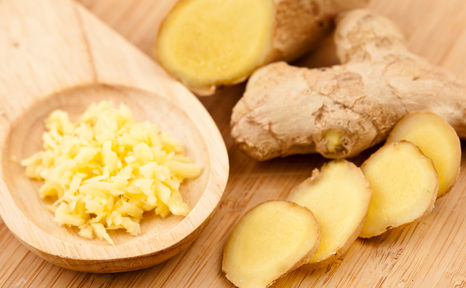

Ginger root as long been associated with alleviating symptoms of arthritis.

For thousands of years, various civilizations have reaped the health benefits of adding more ginger to their diets. The ginger root is often used as a spice or an herbal medicine to treat a number of ailments, ranging from upset stomach to nausea to heart conditions. Over the past few decades, ginger has also become a popular method for alleviating symptoms of arthritis, specifically because it is believed to reduce pain and stiffness.
From scientific research to the most effective methods of consumption, here are a few tips for trying ginger to help treat your arthritis:
In Asian, Indian and Arabic culture, ginger has long been a medicinal tradition. According to the University of Maryland, ginger was used by the Chinese to treat a variety of symptoms more than 2,000 years ago. Even the Roman Empire was eventually introduced to ginger as an herbal remedy for many types of illnesses and disease.
There have been multiple studies that have shown evidence of the benefits ginger may produce for arthritis sufferers. Researchers from the University of Miami found that arthritis patients who used ginger extract experienced reduced pain and stiffness in knee joints by 40 percent when compared to a placebo. Another study reported by Arthritis Research UK involved 29 people with knee osteoarthritis who were given 250 milligrams of ginger four times a day for three months. By the end of the study, those supplied with ginger supplements experienced significant reduction in pain and disease-related disability.
One of the primary reasons ginger is often suggested for those living with arthritis is its anti-inflammatory properties. Ginger possesses a number of compounds called gingerols that are practically on par with the pharmacological properties found in anti-inflammatory drugs. In addition to its anti-inflammatory characteristics, ginger has been known to boost absorption of essential nutrients, eliminate throat and nose congestion and help increase appetite. One study even alluded to ginger consumption easing muscle pain by more than 25 percent after exercise. Frequent physical activity is widely considered as one of the best ways to naturally reduce arthritis pain, which is why taking a little ginger before an intense workout may help your arthritis in more than one way.
Ginger comes in such a wide variety of forms for consumption that it's hard to pick the right way to take it. The Arthritis Foundation suggests taking ginger in capsule form, specifically 100 to 200 milligram ginger capsules. Ginger tea is also an easy way to add a little more of the root to your diet. Before considering ginger as an additional resource of treatment, it's extremely important to remember that ginger can't replace the alleviating qualities of your medication. It's always a good idea to talk with your physician before adding more ginger to combat symptoms of arthritis.
Arthritis Diet: Foods That Can Help Fight Inflammation
Foods to Avoid with Arthritis
Foods That Fuel Joint Health
Copyright © www.orthopaedics.win Bone Health All Rights Reserved